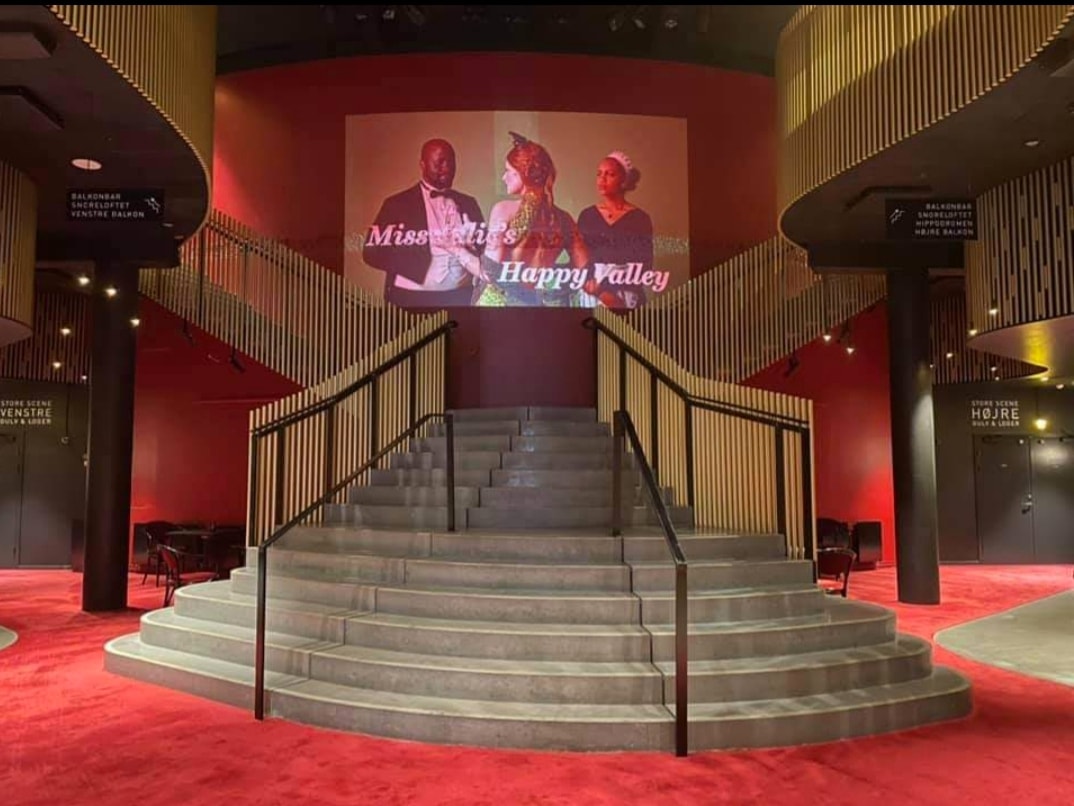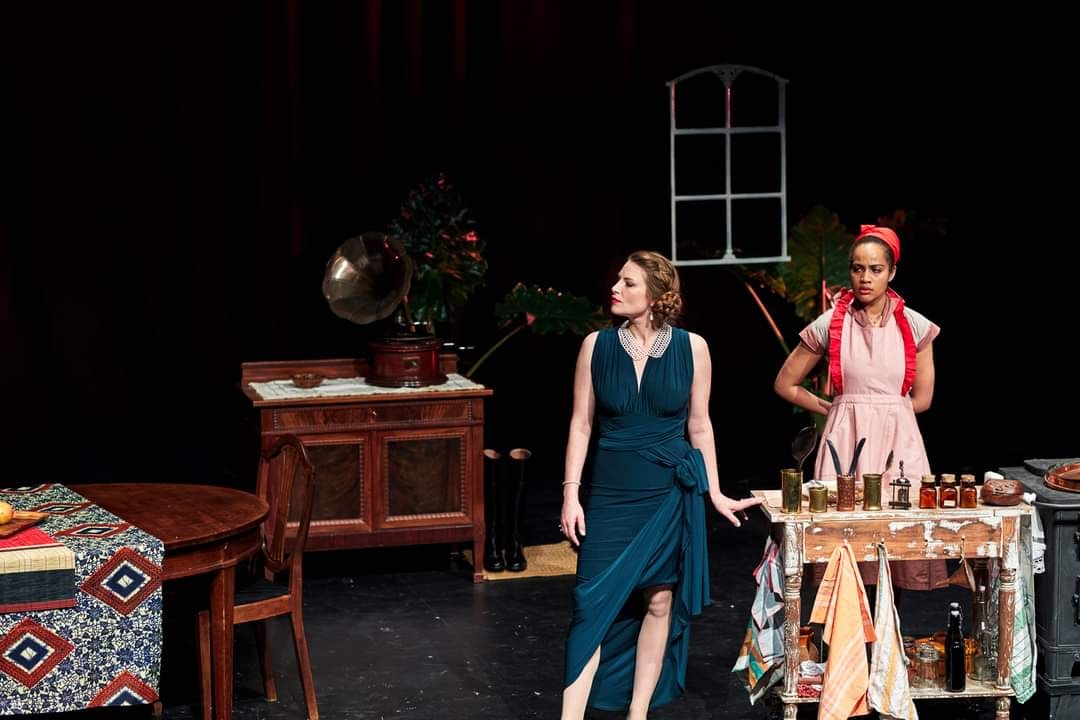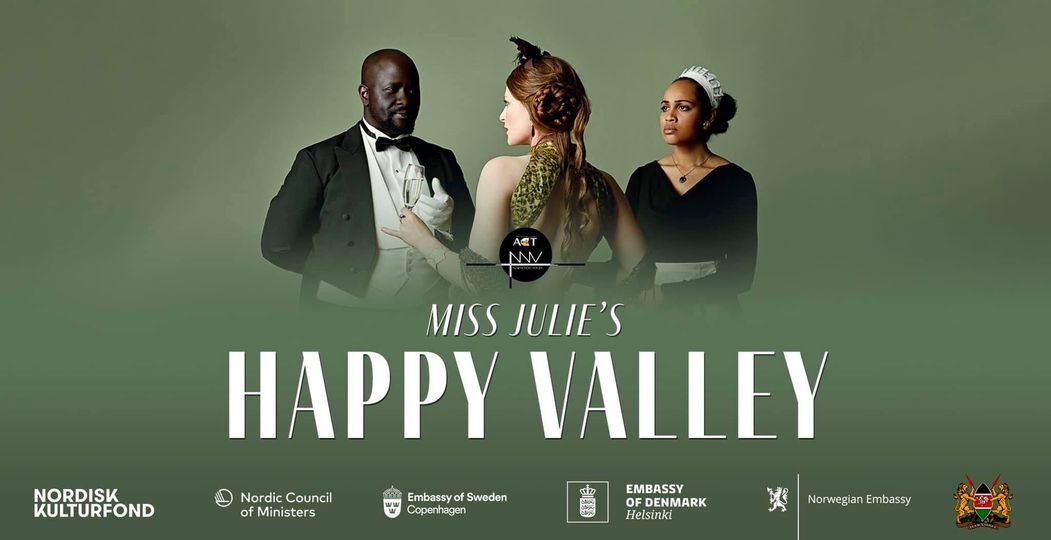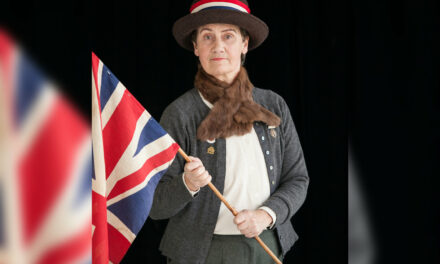Miss Julie’s Happy Valley is the most recent work by playwright Michael Omoke. The new play re-imagines August Strindberg’s classic Swedish play Miss Julie (1888). Omoke’s version revolves around members of ‘Happy Valley’, a small but infamous community of socialites in colonial-era Kenya. In a post on Facebook, while promoting the Finnish leg of the play’s ‘world tour’, Omoke wrote:
The people to whom the expression “Happy Valley” was coined lived in the “White Highlands” of colonial Kenya between 1920s – 1940s. It was a group of ultra-priviledged white Aristocrats infamous for their debauched hedonistic lifestyle. They captured world imagination when their unelected leader, Lord Erroll, was found dead in his Buick the Morning of 28th Jan 1941. To date, 80 years later, the crime remains officially unresolved. In using Miss Julie as a portrait of Alice de Janzé (a notorious member of the Happy Valley Set) the adaptation unlocks the decadent decoy that continues to cover something deeper and wider.
The adaptation ‘unravels the tragic, scandalous, and dubious stories surrounding the Happy Valley Set’. In a review for the The Copenhagen Post, Lena Hunter describes one of the scenes in the play thus:
Deranged chairs litter the parlour room. They seem to have crash-landed in the orbit of a large dining table bristling with empty bottles and wine glasses. The lady of the house, Countess Alice de Janzé, and Lord Errol’s butler Jean stand, panting with rage like lions amongst the chaos, glaring at one another from across the table. The erotic to-and-fro and blazing argument is at the centre of playwright Michael Omoke’s racially-charged reinterpretation of August Strindberg’s Miss Julie.
Playwright Omoke himself plays the role of ‘Jean’ in the play. Jean is a Black butler. Pernille Johansson plays Countess Alice de Janzé (one of Happy Valley’s leading lights). Rebecca Langley plays Christine (Jean’s girlfriend and the countess’s maid). The set was designed by Mia Fasmer Schønnemann. The play was staged at Folketeatret, Copenhagen, Denmark, between 25th and 29 August. Future shows are expected in other countries, including Kenya.

Folketeatret theatre entrance (Credit: media photo).
The Original
The original Miss Julie is a naturalistic play written in 1888 by August Strindberg. It is set on Midsummer’s Eve and the following morning, in the estate of a count in Sweden. In it, the title character is drawn to a senior servant, a well-traveled and well-read valet named Jean. The action takes place in the kitchen of Miss Julie’s father’s manor, where Jean’s fiancée, a servant named Christine, cooks and sometimes sleeps while Jean and Miss Julie talk. The classic play is nuanced and edgy, tackling many themes, including class, gender conflict, idealization, degradation and hypnotism. The following excerpt from a review of the play by SparkNotes, gives a glimpse in the relation dynamics in Strindberg’s masterpiece:
Miss Julie has two subordinates—a daughter and a servant—who are subject to each other’s authority. Julie is Jean’s superior in terms of class; Jean is Julie’s superior in terms of morality, because Jean is a man and Julie is a “degenerate” woman. These differences structure most of the play’s action. The play is conservative in sentiment. It keeps these superior and inferior positions in place, and ultimately submits both characters to the total authority of the Count, who is father and master. An uncountable number of power reversals occur along class and gender lines throughout the play. The difference between Jean and Julie is central to their attraction. Whereas Julie expresses a desire to fall from her social position, Jean expresses an idle desire to climb up from his social position. Jean hopes to better his social status by sleeping with Julie. When he discovers that she is penniless, however, he abandons his plans. By sleeping with Jean, Julie degrades herself and places herself beneath Jean’s level. The power shifts again, however, when Julie reasserts her superior class, mocking Jean’s name and family line.
Apart from Michael Omoke’s take on Miss Julie, there’s a Mies Julie by Yaël Farber (2017) set in South Africa. In a post on Facebook, Omoke wrote about the genesis of play:
As an immigrant playwright in Denmark adapting August Strindberg’s world classic ‘at source’ (Miss Julie first premiered in Copenhagen 1888 as penned by iconic Swedish playwright August Strindberg while he was living here.) has been a ‘once-in-a-lifetime’ open window. The last time I ever wrote, acted and produced a play was exactly 20 years ago in Nairobi, Kenya! The production Miss Julie’s Happy Valley stems from the (previous) project Miss Julie’s Out of Africa.

A scene from Miss Julie’s Happy Valley (Photo: Michael Omoke).
Alcohol, Altitude and Adultery
‘Happy Valley’ was the label attached to an upper-class, colonial-era, East African settler community. Its residents became internationally infamous for ‘The Three As’ (‘Alcohol, Altitude and Adultery’). They lived mainly in the fertile highlands of Kenya. The best-known chronicle of these European socialites is probably the book White Mischief by James Fox. It was later adapted into a film of the same title, starring Charles Dance. Other notable books on this period include White Man’s Country by Elspeth Huxley, The Happy Valley by Christopher Nicole, Out of Africa by Karen Blixen and The Flame Trees of Thika, also by Elspeth Huxley. In White Mischief, investigative writer James Fox wrote:
The pick of the sites in the Kenyan White Highlands had an English air, almost like the rolling downs of Wiltshire, all on a supernatural scale and under such an immense sky, that when you are first exposed to it, you may be seized with both vertigo…and folie de grandeur. Such grandiose surroundings were irresistible to English settlers.
‘Happy Valley’ was an offshoot of British colonialism and adventurism in East Africa. In 1902, legendary explorer Harry Johnston wrote in a letter:
For twenty miles at a stretch on the beautiful heights and happy valleys of the Mau (inland Kenya), you are in the presence of an unintentional European colony, some of which will no doubt disappear with the completion of the railway, but much of which must be the nucleus of the great white colony one may hope to see established on the only land really fitted for its development in Equitorial Africa…

A scene from Miss Julie’s Happy Valley (Photo: Michael Omoke).
As to the Happy Valley set in general, De Janzé (an adventurous aristocratic Frenchman who came to Kenya with his American wife) described them thus, in 1931:
In this décor live a restless crowd of humans, hardly colonisers – wanderers, perhaps, indefatigable amusement seekers weary or cast out from many climes, many countries…
According to Elspeth Huxley’s White Man’s Country:
It was nothing to have an Italian Count or Australian Baron thrown through the window (of the hotel room) on to your bed in the middle of the night.
Between the 18th and the 20th centuries, the controversial British Empire grew into the largest domain in history. It was famously described as ‘The Empire on which the sun never sets.’ British colonial rule ended in Kenya ended in 1963, following armed resistance as well as political pressure by the indigenous population.
This post was written by the author in their personal capacity.The opinions expressed in this article are the author’s own and do not reflect the view of The Theatre Times, their staff or collaborators.
This post was written by Alexander Nderitu.
The views expressed here belong to the author and do not necessarily reflect our views and opinions.


















